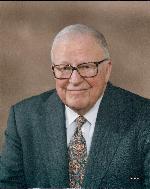


Robert Edward Lee Strider II, scholar, teacher and president of Colby College from 1960-1979, died Sunday (Nov. 28) in Boston. He was 93.
On news of his death, Colby’s current President William D. Adams noted that Strider led Colby “during one of the most challenging times in its history, and in many ways Colby’s national reputation is his legacy.”
Born April 8, 1917, in Wheeling, West Virginia, Strider was the son of the Rev. Robert E.L. Strider, later Bishop of the Diocese of West Virginia, and Mary Holroyd Strider, who died at his birth. Valedictorian of his class at the Linsly Institute, a private military school in Wheeling, he studied at Episcopal High School in Alexandria before entering Harvard University where he graduated, cum laude, in 1939.
The following year, while teaching and earning his master’s degree, he met and fell in love with Helen M. Bell, a Radcliffe sophomore. They were married in 1941. Robert is survived by four children: Mary (Bruenn), Robert, William, and Elizabeth (Dain); three grandchildren: Marjorie, Katharine and Mary; two great-grandchildren, Zakariya and Joseph; and his sister, Barbara Kuehn, and brother, David Strider. His wife, Helen, died in 1995 at their beloved summer home in Mackinaw City, Michigan.
At the onset of World War II, Strider served as an ensign and then lieutenant in Navy communications, stationed in Washington, D.C. After his discharge, in 1946 he joined the English department at Connecticut College, completing his Harvard Ph.D. in 1950. He came to Colby in 1957 as Dean of Faculty, and in 1960, at the age of 42, succeeded Julius Seelye Bixler as Colby’s seventeenth president. He served for twenty years, at the time the longest presidential tenure in the College’s history.
During his Colby presidency, he prevailed as an academic leader and introduced a number of lasting curricular innovations including the now widely imitated January Program of Independent Study. He led the College to residential co-education, and broadened the curriculum to include foreign study opportunities, interdisciplinary studies, and non-Western and Black studies.
One of the most significant achievements of his administration came in 1962 when the Ford Foundation chose Colby as one of eighteen “centers of academic excellence” and awarded the College a two-for-one matching grant of $1.8 million, an amount nearly six times greater than any gift the College had ever received. The grant placed Colby for the first time in the small circle of America’s finest small liberal arts colleges.
Of the Ford grant, Adams said that Strider “brought to Colby its first major recognition from a prominent foundation and bolstered the college’s financial position to allow us to reach far beyond Maine and New England for outstanding students. He also was president during the extraordinary period when an unpopular war, political assassinations, and total upheaval in the way young Americans chose to live their lives blew up everything we knew about how students ought to behave on college campuses. He was clear that those times were often very difficult for him, but his description of things was characteristically low-key. He told me, ‘I think, at times, we lost our sense of humor.’”
An avid writer and correspondent, early in his career he published Robert Greville, Lord Brooke (Harvard University Press, 1958). With his daughter, Elizabeth, he published a private memoir of Helen in 1996.
Strider’s myriad professional positions included the presidency of the New England Association of Schools and Colleges (1966) and the chairmanship of the Association of American Colleges (1974). He was also a Fellow of the American Academy of Arts and Sciences. In the 1980s, he chaired a Governor’s commission to study the University of Maine.
The many tributes to him included honorary degrees from eleven colleges, including Colby, which presented honorary doctorates to him and his wife on his retirement in 1979. He was named a Life Trustee of the College and a scholarship was created in the Strider name. The newly constructed theater in Runnals Union was named in their honor, and in recognition of their love of music, especially choral music, the College established the annual Strider Concert. Also in 1979, the Maine Bar Association presented him with its Distinguished Citizen Award. In 2000, the City of Waterville named Strider Avenue for him.
A lifelong, active Episcopalian, he served vestries at St. James in New London, CT; St. Marks in Waterville, ME; and Church of Our Saviour in Brookline, MA. His travels, most often with his wife Helen, covered all fifty states, more than thirty countries, and six continents.
After his retirement, the Striders moved to Brookline, MA, and he served for a time as Professor and Dean at Wentworth Institute of Technology in Boston. Following Helen’s death, he took residence at the Springhouse retirement community in Jamaica Plain, MA, where he remained active in the pursuit of scholarship, lecturing on Shakespeare and poetry and leading current events discussions until the time of his death.
There will be a memorial service at The Episcopal Church of Our Saviour on 25 Monmouth St., Brookline, MA, on Sunday, December 5, 2010 at 2:00 PM.
In lieu of flowers, memorial contributions may be to the charity of one’s choice, or to: The Helen and Robert E.L. Strider Scholarship Fund, Office of College Relations, Colby College, 4320 Mayflower Hill, Waterville, ME 04901-8843, or to: The President and Fellows of Harvard College/Harvard Choral Endowment, c/o Gary Snerson, 124 Mt. Auburn St., Cambridge, MA 02138.
www.lawlerfuneralhome.com